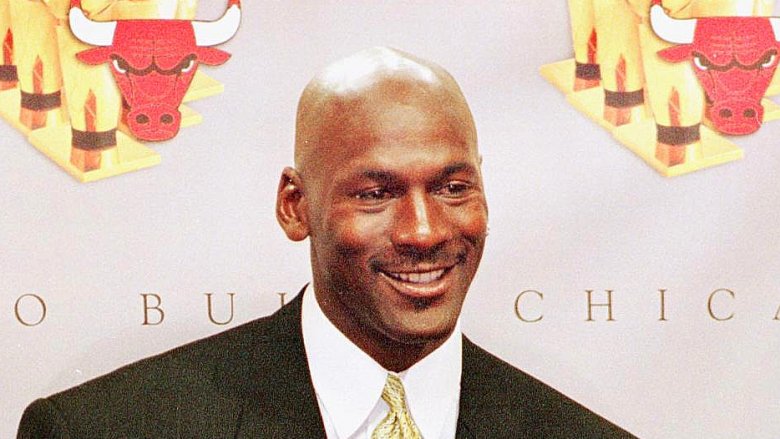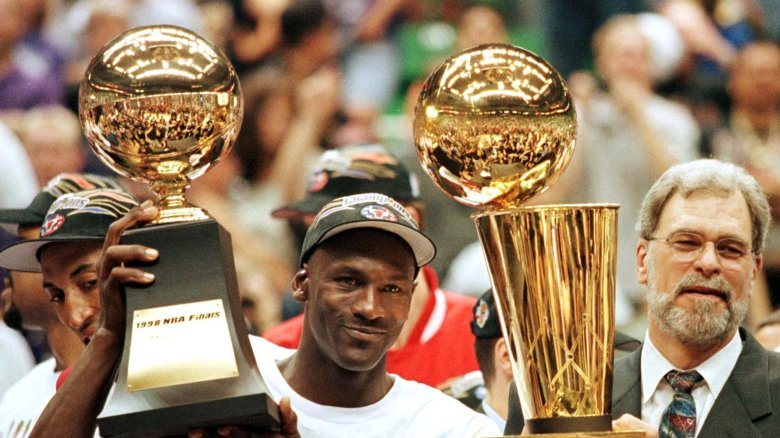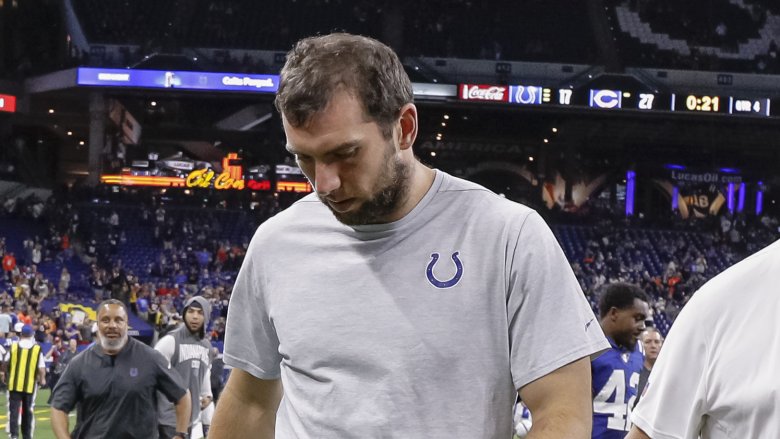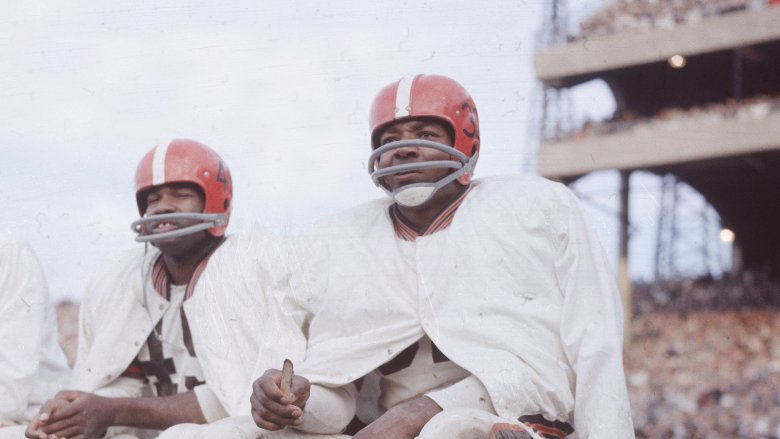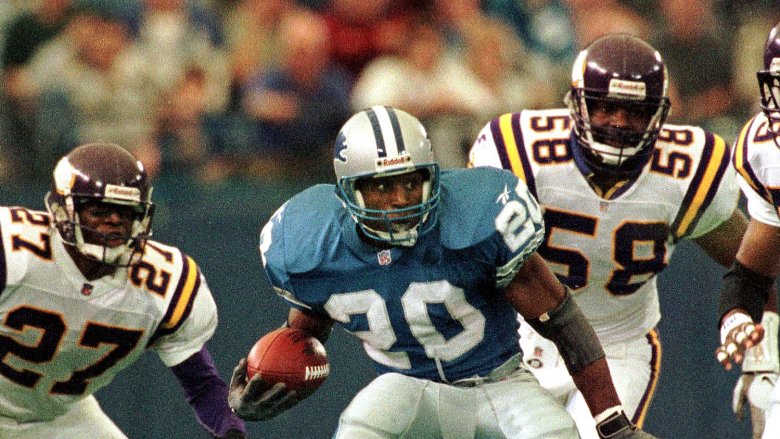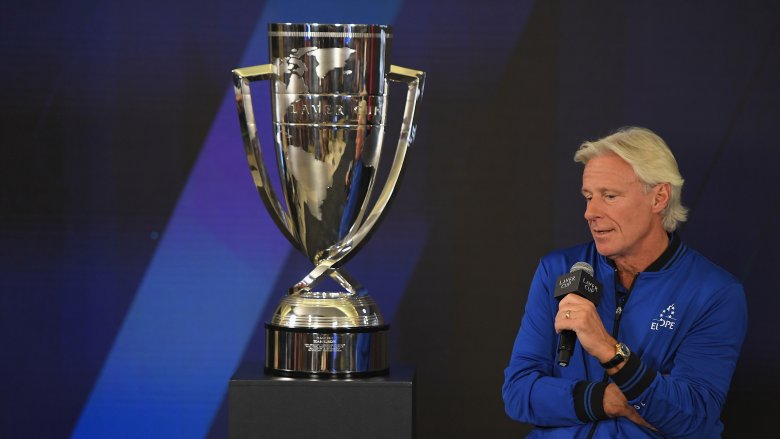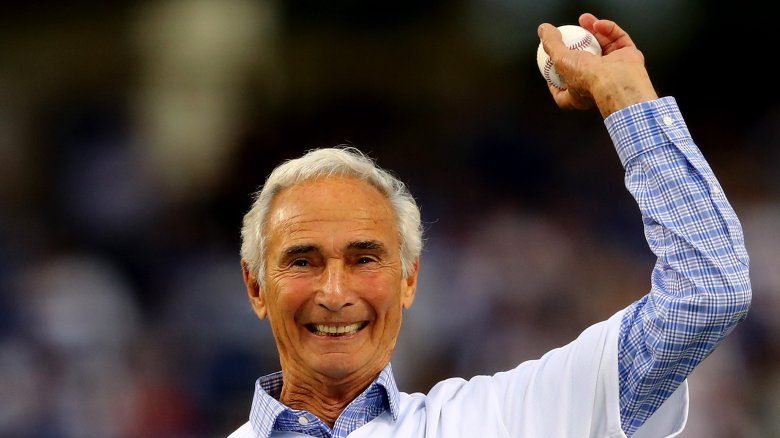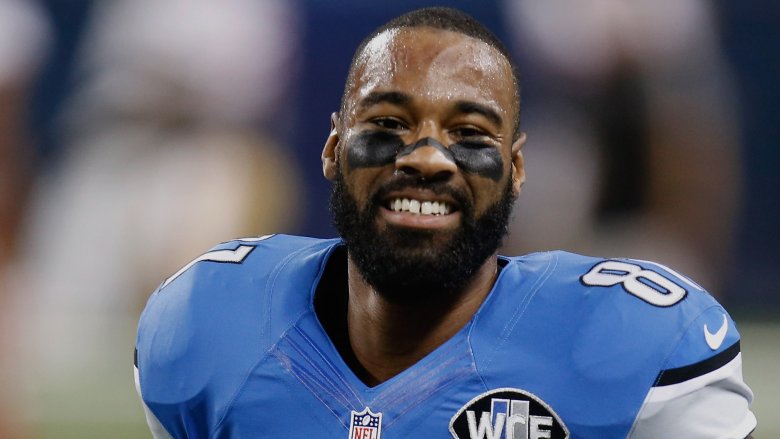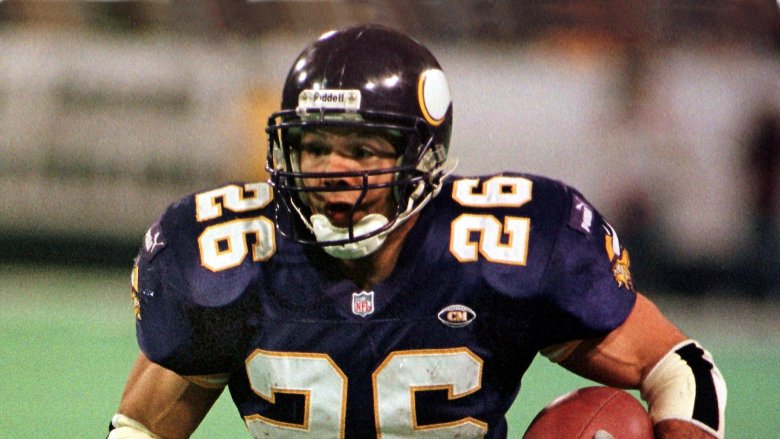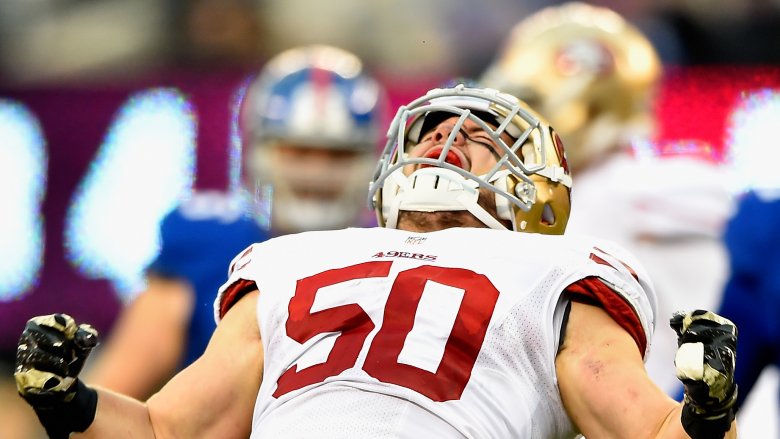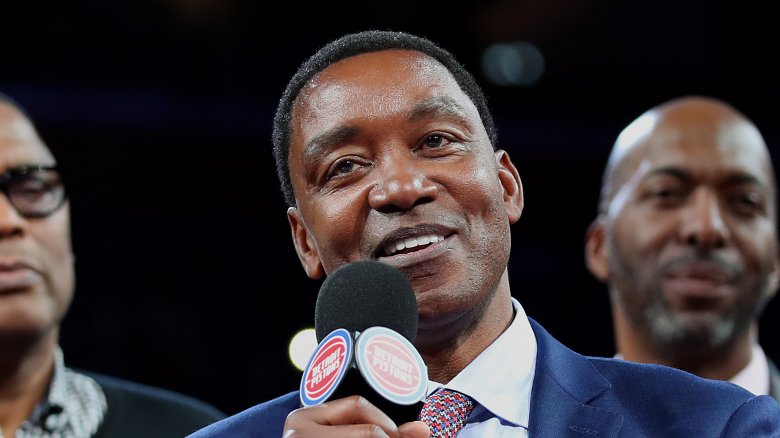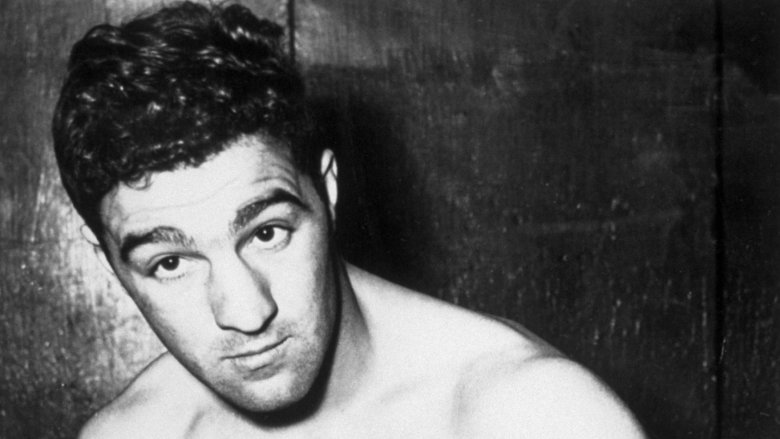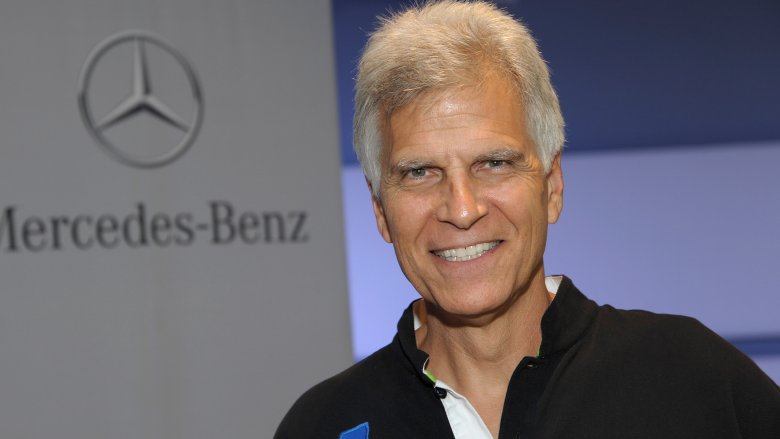The Most Surprising Early Retirements In Sports History
We mere mortals often fail to understand why any successful professional athlete would want to retire early and, in many cases, while still in his or her prime. Such sports stars earn fortunes for their successes and also through endorsements. They're respected and adored. New England Patriots quarterback and NFL living legend Tom Brady goes to great lengths to extend his career as long as possible. (Have you ever tried that avocado ice cream Brady has talked and written about? Blech.) Why would somebody elect to call time on their playing career early rather than follow in Brady's footsteps?
Indianapolis Colts signal-caller Andrew Luck generated headlines and stunned the football community in August 2019 when he announced his retirement at the age of 29. Granted, Luck took beatings while on the field. He even missed an entire season due to injury. Nevertheless, he elected to leave at least $100 million on the table rather than attempt to rehab another physical setback and return to the Indianapolis lineup at some point during the 2019 campaign. For Luck, the benefits that came with playing the most important position in his sport weren't worth the pain he endured for years. One wonders if similar early retirements will be commonplace in the NFL throughout the 2020s.
Michael Jordan's first retirement shocked the sports world
Michael Jordan's first retirement from the NBA in 1993 was so shocking and unexpected, there are still some sports conspiracy theorists out there who are convinced MJ has never given the real reason(s) for why he walked away that October. It's understandable fans question Jordan's motives from that fall. Months earlier, he and the Chicago Bulls won a third consecutive NBA title, and Jordan was clearly the best basketball player on the planet who wasn't slowing down. "His Airness" choosing to exchange his famous basketball shoes for a bat and a stint in Minor League Baseball baffled fans and outside observers.
In March 1995, Jordan returned to the Bulls and the Association via an epic and brief press release that announced: "I'm back." It didn't take long for fans and the rest of the league to realize the old Jordan was, indeed, back, as he and the Bulls embarked on yet another three-peat before he retired a second time in 1999. In September 2001, Jordan returned to the court a third and final time with the Washington Wizards. He spent two seasons playing for the Wizards and averaged over 20 PPG in both of those campaigns.
Andrew Luck walked away before his 30th birthday
The Indianapolis Colts seemed to be the luckiest (pun intended) franchise in the NFL back in the spring of 2012, as the franchise was able to move on from Peyton Manning, the greatest regular-season quarterback in league history, and then draft Andrew Luck. Luck entered the NFL the top QB prospect since Manning, and he led the league in passing touchdowns for the 2014 campaign. By the end of the 2018 season, Luck was a four-time Pro Bowl signal-caller and a 29-year-old who should have been entering his physical prime.
Instead, Luck retired out of nowhere in August 2019 following years of injuries he sustained while playing behind lousy offensive lines as a pro. An operation on his shoulder ultimately cost him the 2017 season, and an ankle injury made him a spectator throughout the 2019 preseason. During his retirement press conference, Luck admitted that the process of constantly rehabbing physical setbacks robbed him of the joy he once felt playing football. Perhaps the biggest shame of all is that the Colts finally built a respectable offensive line and did well to surround Luck with offensive talent ahead of September 2019. Unfortunately for the franchise, it was a case of too little, too late.
Jim Brown may have been the greatest football player of all time
Regardless of when you are reading this, odds are you know a football fan who believes Jim Brown is the greatest player in history. From 1957 through 1965, there was no better ball-carrier than the Cleveland Browns icon who made the Pro Bowl in all nine of his seasons. Brown led the league in rushing on eight occasions, he finished atop the rushing touchdowns category five times and he won MVP honors in 1957, 1958 and 1965. In 1964, Brown helped Cleveland win the NFL championship, something the Browns failed to accomplish from 1965 through (at least) the end of the 2018 campaign.
Brown rushed for over 1,500 yards and 17 touchdowns in 1965, and he was at the peak of his career when he retired in July 1966. He had already entered the world of acting while still a player and was on the set of The Dirty Dozen when he announced the end of his career. Per Dawg Pound Daily, Brown's filming schedule led to him missing training camp, which irritated team owner Art Modell. It's possible, perhaps likely, Brown would've played at least one more year had Modell not threatened to fine his star player for missing meaningless practices.
Barry Sanders retired after rushing for nearly 1,500 yards the previous season
Depending on your age, you may view Barry Sanders as the greatest running back to retire while still able to excel in the NFL. The Lions drafted Sanders third overall in 1989 after the Green Bay Packers selected Tony Mandarich. (That's right: The Packers could've had both Sanders and Brett Favre in the same lineup.) A Pro Bowl mainstay from 1989 through 1998, Sanders won four rushing titles during the 1990s, and the elusive back twice earned Offensive Player of the Year honors and took home the MVP award for the 1997 season. In 1998, Sanders rushed for over 1,400 yards for the fifth consecutive season. There was little doubt he was going to break the career rushing yards record, held by Walter Payton at the time, before the end of the 2000 season.
Sanders never reached that milestone, though, as he faxed a retirement letter to his hometown newspaper in July 1999. As documented by BleacherGuy.com, Sanders offered no lengthy explanation for why he retired while healthy and still able to feature as one of the best backs in the sport. 20 years after that announcement, Sanders called his retirement "clumsy" while speaking with Carlos Monarrez of the Detroit Free Press.
Bjorn Borg hung his racket up at 26
As explained by the International Tennis Hall of Fame, Bjorn Borg made history when he became the youngest male to win the French Open title in 1974. When he lifted that tournament's trophy a sixth time in 1981, he had won his 11th major championship, a record for the Open Era at the time. Borg's rivalry with John McEnroe, spotlighted in the film Borg vs. McEnroe, remains one of the sport's greatest on-the-court feuds, as they faced off 14 times from 1978 through 1981. According to Ubitennis, both men won seven of those matches.
At the age of 26, the cool and often quiet Borg stunningly announced his retirement in 1983. McEnroe tried to convince his rival to reconsider, and Borg eventually attempted a comeback in the early 1990s, during which he failed to cover himself in glory. By '81, however, the all-time tennis great with a rock star look and his own groupies who attended tournaments was burned out to the point that he admittedly didn't care all that much about losing, even to McEnroe. The only significant accomplishment missing on his resume at the end of his career was a US Open championship (he only played in an Australian Open once, which he did at the age of 17).
Pain drove Sandy Koufax from baseball early
There are books and documentaries dedicated to Sandy Koufax's pitching greatness. One interesting stat is that Koufax held the record for most wins tallied by a Los Angeles Dodgers pitcher from 1966 through August 2019 until Clayton Kershaw recorded his 166th victory as a member of the organization. As masterful as Kershaw has been during his career, Koufax was even better, particularly from 1961 through 1966. Over that period, Koufax won the Cy Young Award three times, he was named World Series MVP twice and he completed the pitching Triple Crown (led the league in wins, strikeouts, and ERA) on three occasions.
Koufax was only 30-years-old and the reigning NL Cy Young winner when he announced his retirement in November 1966. As explained by the Baseball Hall of Fame, severe arthritis plagued the southpaw, and he could no longer endure the pain that came with taking the hill. In 1972, he became the youngest player ever elected to the Hall (36-years-old). In July 1999, Sports Illustrated named him the magazine's "favorite athlete" ever, ahead of sports giants such as Muhammad Ali, Babe Ruth, Michael Jordan, and Wayne Gretzky.
Megatron retired as potentially the best WR in the NFL in 2016
Wide receiver Calvin Johnson played for some dreadful Detroit Lions teams during his nine-season career. The 2008 Lions went 0-16, and the franchise made the playoffs a total of three times from 2007 through 2015. Johnson wasn't to blame for his team's failures, though, as the six-time Pro Bowl wideout led the NFL in receiving touchdowns in 2008 (12), finished the 2012 campaign as the league's leader in catches and set a record that year by tallying 1,964 receiving yards. In 2015, Megatron caught 88 passes for over 1,200 receiving yards, and he found the end zone nine times.
The following March, Johnson retired at the age of 30, relatively young for a healthy wide receiver with his physical attributes. "My biggest regret is that I wasn't able to help give our fans a championship," Johnson admitted via an official team statement, per the Detroit Free Press. As explained by ESPN, only Torry Holt and Jerry Rice accumulated more receiving yards over nine seasons than Johnson, and Johnson retired with more receiving yards and receiving scores than any other NFL player who never won a single playoff contest.
Robert Smith retired while relatively healthy after eight seasons
Robert Smith may not be the first name who comes to mind when thinking of former football stars, and not just because of his unassuming name. Following a handful of average seasons and a couple of torn ACLs, the Minnesota Vikings running back enjoyed a breakout campaign in 1997, when he rushed for 1,266 yards and six touchdowns. He earned Pro Bowl nods for the 1998 and 2000 seasons, and he posted a career-best 1,521 rushing yards in 2000. At 28-years-old, Smith was in his prime and a back with at least a few years of good play left in the tank.
As ESPN's Kevin Seifert detailed in 2015, though, the ball-carrier was dealing with the early stages of alcoholism by the time he retired after his eighth season. While he left the game due to concerns about his future health, his drinking admittedly worsened once he lost the structure provided by a player's professional calendar. The good news is, in May 2019, Smith announced via Twitter that he had celebrated his seventh year of sobriety. He is the founder and CEO of the Fan Health Network.
One NFL season was enough for Chris Borland
Chris Borland's ceiling touched the stars after the 2014 season. The linebacker selected by the San Francisco 49ers in the third round of the NFL Draft appeared in 14 games, made eight starts and became a cornerstone for his team's defense. The NFL named Borland Defensive Player of the Month for November after he won Rookie of the Week twice that month.
An ankle injury prematurely ended his debut campaign before Christmas Day, but there was no indication that setback would affect him ahead of San Francisco's subsequent training camp. The Pro Football Writers Association named Borland to its All-Rookie Team following the season.
In March 2015, a fully-fit Borland retired from the NFL before his 25th birthday. Per NFL.com, Borland explained on ESPN's Outside the Lines that he believed he'd suffered three concussions during his life, and that worries about the effects of head trauma resulted in his decision to permanently end his career. He turned to a life of social activism, and, as detailed by NPR, he called upon the Catholic Church to champion additional gun control laws in the United States in the summer of 2019.
Isiah Thomas theoretically could've played until he was 40
Detroit Pistons legend Isiah Thomas probably retired with few regrets following the 1993-94 season. By the spring of 1994, Thomas was a 12-time All-Star who owned two championship rings and who was named 1990 NBA Finals MVP, plus he was respected as one of the greatest point guards to play the position. His physical brand of basketball as a member of the "Bad Boys" Pistons resulted in Thomas suffering a myriad of injuries throughout his career, and a torn Achilles sidelined the Hall of Famer in April 1994. He walked away from the game at the age of 32.
Years later, Thomas admitted that he planned to retire before the Achilles tear, but also that he regretted that decision. In an interview posted by Inside the Lakers in November 2013, Thomas claimed he wasn't sure if being emotionally and physically checked out led to the last injury of his career. He also said he had second thoughts about retiring too soon roughly a year after that initial decision. History tells us Thomas likely wouldn't have returned to his All-Star form after injuring his Achilles, but he would've been able to hang in a lineup for several seasons had he felt an overwhelming urge to unretire.
Rocky Marciano retired unbeaten
Any conversation about the greatest heavyweight boxers in history had better include Rocky Marciano, or it's for naught. From 1947 through September 1955, "The Brockton Blockbuster" won all 49 of his professional bouts, and 43 of those victories came via knockout. In September 1952, Marciano won the world heavyweight championship after he dropped then-champion Jersey Joe Walcott in the 13th round of a match Walcott was winning on the scorecards. Marciano held the heavyweight crown past his 32nd birthday and his win over Archie Moore in September 1955.
With a potential rematch versus Moore looming, Marciano retired an unbeaten champion in April 1956. Per ESPN, the original "Rock" (apologies to Dwayne Johnson) remains the only undefeated heavyweight champion to exit the sport with an unblemished record. According to The Independent, Marciano rejected numerous offers to return to the ring, minus a "heavily choreographed" closed-door session with Muhammad Ali in 1969. That same year, Marciano was killed in a plane crash just one day before celebrating his 46th birthday. According to Boxing Monthly, human error and avoidable mistakes resulted in Marciano's untimely death.
Ken Dryden spent less than a decade in the NHL
While injuries drove Bobby Orr off the ice when he should've been the best defensemen in the NHL, goaltender Ken Dryden departed the league on his own terms at the age of 31 because he had other interests. Dryden won his first of five Vezina Trophy awards for the 1972-73 season, but he sat out the following campaign due to a contract dispute with the Montreal Canadiens. As explained by NHL.com, Dryden earned a law degree during that sabbatical, but he returned to the crease for the 1974-75 campaign. From 1976 through the end of the decade, the 6-foot-4 goaltender with a "wingspan that reportedly exceeds that of Muhammad Ali," according to The Globe and Mail, guided his club to four straight Stanley Cup titles.
Dryden kept busy following his playing days. He worked as a television commentator during multiple Winter Olympics broadcasts, spent seven seasons within the front office of the Toronto Maple Leafs and then embarked on a successful political career. In May 2019, Dryden criticized Gary Bettman regarding the commissioner's comments about head hits being an "inevitable" part of NHL games.
Mark Spitz retired at 22 to make money
Decades before Michael Phelps established himself as the most decorated Olympic swimmer in history, Mark Spitz became a household name for his performances at the 1972 Summer Games. After he earned a pair of team golds in 1968, Spitz won a record seven gold medals (Phelps topped that mark by winning eight golds in 2008) in Munich — four individual and three team — and the brash and outspoken American known for sporting his trademark mustache retired soon after those Olympics at the age of 22 to cash-in on his fame through endorsement deals and other business opportunities.
"I retired because I didn't have a future in swimming because we couldn't make money," Spitz admitted during an interview in 2011. "The rules were different back then than they are today." As noted by ESPN, Spitz was accused of "blatant commercialism" by the Soviets after he waved his shoes toward the crowd while on the medal stand at the '72 Games. Nobody imagined at the time millionaire NBA players would be allowed to feature in an Olympic basketball tournament decades later.
According to the International Swimming Hall of Fame, Spitz held 33 official and recognized world records upon his retirement. ESPN ultimately named him 33rd on their list of the 50 greatest North American athletes of the century.
